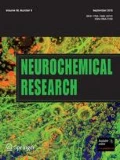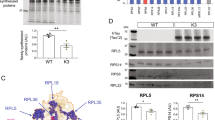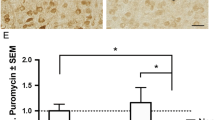Abstract
All cells rely on efficient protein synthesis in order to maintain cellular homeostasis. Recent studies from our laboratory indicate that declines in protein synthesis and ribosome function occur in the earliest stage of Alzheimer’s disease (AD). Additional studies indicate a potential role for ribosomal RNA oxidation as a potential mediator of decreased protein synthesis in AD. The ribosome is a complex of proteins and nucleic acids that mediates all protein synthesis. At present it is unclear if significant alterations in ribosomal RNA occurs within the ribosome complex during the progression of AD. In this study we examined the amount of ribosomal RNA in the different ribosomal fractions generated from control subjects, individuals with mild cognitive impairment (MCI), and individuals with AD. Studies were conducted in the inferior parietal lobule of each subject. Together, these data demonstrate that during the progression of AD there is a gross decline in the amount of ribosomal RNA within the ribosome complex. Additionally, these studies provide evidence for gross elevations in RNA oxidation within the ribosome complex of MCI and AD. Together, these data strongly suggest a role for RNA alterations within the ribosome as a mediator of decreased protein synthesis in both MCI and AD.



Similar content being viewed by others
References
Petersen RC, Smith GE, Waring SC, Ivnik RJ, Kokmen E, Tangelos EG (1997) Aging, memory, and mild cognitive impairment. Int Psychogeriatr 9:65–69
Petersen RC, Smith GE, Waring SC, Ivnik RJ, Tangelos EG, Kokmen E (1999) Mild cognitive impairment: clinical characterization and outcome. Arch Neurol 56:3003–3308
Langstrom NS, Anderson JP, Lindroos HG, Winblad B, Wallace WC (1989) Alzheimer’s disease-associated reduction of polysomal mRNA translation. Brain Res Mol Brain Res 5:259–269
Ding Q, Markesbery WR, Chen Q, Li F, Keller JN (2005) Ribosome dysfunction is an early event in Alzheimer’s disease. J Neurosci 25:9171–9175
Markesbery WR, Kryscio RJ, Lovell MA, Morrow JD (2005) Lipid peroxidation is an early event in the brain in amnestic mild cognitive impairment. Ann Neurol 58:730–735
Aloni R, Peleg D, Meyuhas O (1992) Selective translational control and nonspecific posttranscriptional regulation of ribosomal protein gene expression during development and regeneration of rat liver. Mol Cell Biol 12:2203–2212
Cosgrove JW, Rapoport SI (1986) Preparation of a cell-free extract from rat brain which can initiate protein synthesis in vitro. Neurochem Res 11:1289–1301
Ding Q, Lewis JJ, Strum KM, Dimayuga E, Bruce-Keller AJ, Dunn JC, Keller JN (2002) Polyglutamine expansion, protein aggregation, proteasome activity, and neural survival. J Biol Chem 277:13935–13942
Ding Q, Dimayuga ED, Markesbery WR, Keller JN (2006) Proteasome inhibition induces reversible impairments in protein synthesis. FASEB J (in press)
Honda K, Smith M, Zhu X, Baus D, Merrick WC, Tartakoff AM, Hattier T, Harris PL, Siedlak SL, Fujioka H, Liu Q, Moreira PI, Miller FP, Nunomura A, Shimohama S, Perry G (2005) Ribosomal RNA in Alzheimer’s disease is oxidized by bound redox-active iron. J Biol Chem 280:20978–20986
Shan X, Tashiro H, Lin CL (2003) The identification and characterization of oxidized RNAs in Alzheimer’s disease. J Neurosci 23:4913–4921
Keller JN, Schmitt FA, Scheff SW, Ding Q, Chen Q, Butterfield DA, Markesbery WR (2005) Evidence for increased oxidative damage in subjects with mild cognitive impairment. Neurology 64:1152–1156
Li X, Alafuzoff I, Soininen H, Winblad B, Pei JJ (2005) Levels of mTOR and its downstream targets 4E-BP1, eEF2, and eEF2 kinase in relationships with tau in Alzheimer’s disease brain. FEBS J 272:4211–4220
An WL, Cowbern RF, Li L, Braak H, Alafuzoff I, Iqubal K, Iqbal IG, Winblad B, Pei JJ (2003) Up-regulation of phosphorylated/activated p70 S6 kinase and its relationship to neurofibrillary pathology in Alzheimer’s disease. Am J Pathol 163:591–607
Onuki R, Bando Y, Sayuma E, Katayama T, Kawasaki H, Baba T, Tohyama M, Taira K (2004) An RNA-dependent protein kinase is involved in tunicamycin-induced apoptosis and Alzheimer’s disease. EMBO J 23:959–968
Peel AL, Bredesen DE (2003) Activation of the cell stress kinase PKR in Alzheimer’s disease and human amyloid precursor protein transgenic mice. Neurobiol Dis 14:52–62
Zhang K, Kaufman RJ (2006) The unfolded protein response: a stress signaling pathway critical for health and disease. Neurology 66:102–109
Acknowledgements
The authors would like to thank Drs Ana Maria Eleuteri, Quinghua Chen, Harry LeVine, Annadora Bruce-Keller for technical discussions and helpful discussions. The authors also thank those who donated their brain tissue to make these studies possible. This work was supported by grants from the National Institutes of Aging. Valentina Cecarini was supported by a fellowship from the University of Camerino.
Author information
Authors and Affiliations
Corresponding author
Rights and permissions
About this article
Cite this article
Ding, Q., Markesbery, W.R., Cecarini, V. et al. Decreased RNA, and Increased RNA Oxidation, in Ribosomes from Early Alzheimer’s Disease. Neurochem Res 31, 705–710 (2006). https://doi.org/10.1007/s11064-006-9071-5
Accepted:
Published:
Issue Date:
DOI: https://doi.org/10.1007/s11064-006-9071-5




